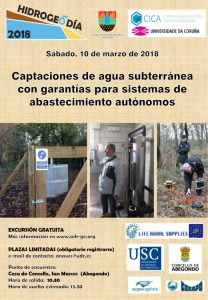This Saturday 10th of March, the Asociación Española de Hidrogeólogos (Spanish Association of Hydrogeologists) organizes the “Hydrogeoday”, a scientific dissemination workshop in hydrogeology, that will take place in Galicia, under the direction of the research group “Agua y Suelo – AQUASOL” (Water and soil), belonging to CICA (Centro de Investigaciones Científicas Avanzadas) from the Universidade da Coruña
Poster of the Hydrogeoday workshop.
More info: http://www.aih-ge.org/
The focus will be in good practices for quality groundwater collection from small water supplies, which are quite abundant in rural areas.
The workshop is open to all kind of people and is free of charge. But places are limited and is necessary to enroll in advance via e-mail.
09:45 bus from A Coruña center, to Escuela de Caminos and later on to Abegondo townhall.

